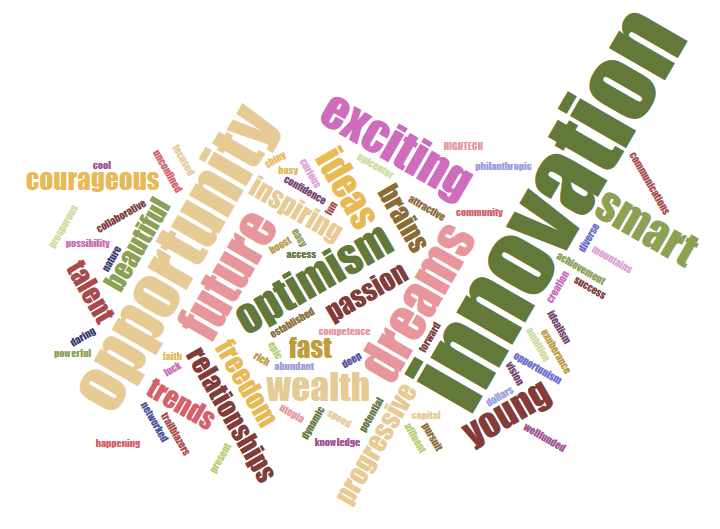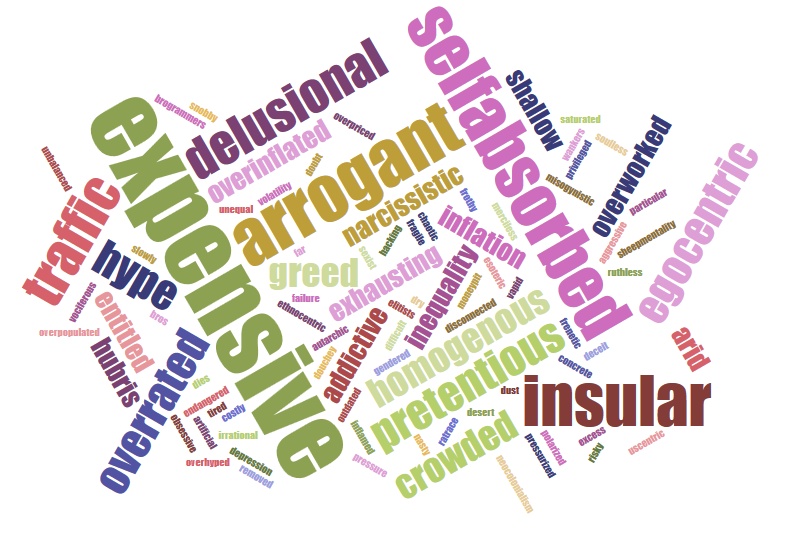
Silicon Valley is known for a lot of positive things, but there’s clearly a negative sentiment from outsiders. The question is, does Silicon Valley want to fix this image problem?
Decades ago, before it was called “Silicon Valley,” it was an area abundant with fruit and flower farms, redwood harvesting, and scattered towns connected via dirt roads. This fruitful area has also blossomed into computer chips, hard drive platters, networking gear, devices, computers, and internet companies galore. Many have become famous, gathered many riches, and helped to change other people’s lives. Today, Silicon Valley is experiencing the second gold rush, where investors, entrepreneurs, workers, and more flock to this region to strike it rich and make a difference.
To understand perception, I asked my social media network of followers and friends who are NOT from Silicon Valley to chime in and leave three words about what their perceptions are of Silicon Valley, see the raw post on FB. The goal wasn’t to argue, or to judge, but to listen and learn what others think. We stripped out any answers from folks that I knew were from the area, and well, the findings are pretty surprising. There’s quite a bit of negative sentiment toward Silicon Valley, in addition to the adoration. Of course, this is not a truly scientific endeavor, these respondents are in my social graph, and I would make the assumption they’re familiar with the tech industry or business, which is my primary topic.
A few findings: There are 534 words submitted that are ‘stand alone’ words. We segmented the data by sentiment; 161 are positive, 192 are negative, 181 are neutral. It was difficult to classify some of the phrases or words, so we had to do some data massaging and remove synonyms. There were some clear trends, as ‘Expensive’ showed up 36 times and ‘Innovative/innovation’ showed up 38 times. All of those wonderful things come with some severe drawbacks, which are nicely illustrated in the tag cloud, first let’s explore the positive sentiment.
Below Word Cloud: Positive attributes provided from people who are NOT from Silicon Valley.
The patterns are clear; Innovation scores the highest, then opportunity, exciting, optimism, and dreams. If I had to summarize it, this is a place to create and fulfill a dream. It’s arguable if young is a positive sentiment, as ageism is becoming rampant as investors favor the youth. It’s also interesting to see a variety of descriptions related to smart, ideas, and knowledge. I assume beautiful is related to the area, as the culture in Silicon Valley isn’t driven by physical beauty or fashion.

Below Word Cloud: Negative attributes provided from people who are NOT from Silicon Valley.
Big trends are around the expensive cost of living (now the highest in the nation), arrogant, self-absorbed, delusional, and insular. Basically, if I had to summarize it up, it would be “Rich Asshole.” While the previous tag cloud shows a region where people are fulfilling dreams, you can see how this quickly results in terms like “overworked, entitled, inequality” for those that make it. This of course results in interesting terms like “hype, overinflated, and ethnocentric.”

Below Word Cloud: Both positive, negative and neutral attributes provided from people who are NOT from Silicon Valley.
Putting all the data together, you can see how al the terms nicely come together, including some neutral terms like “Unicorn, Investment, Money, White” and other names of popular local companies. Together, this is a real indicator that this is a dynamic region filled with ups and downs and complexities in a fast moving environment.

Silicon Valley has an image problem, should they fix it?
Beyond all the positives of entrepreneurs chasing their dreams to change the world (while getting rich at it), Silicon Valley has a perception issue relating to an insular entitled group of rich assholes. A question I have for you is: Is Silicon Valley aware of this perception gap? Do they care? Should they do anything about it? Or is this just the natural state of an innovation area? Love to hear your thoughts in the comments.
Could you imagine the Santa Clara or San Mateo chamber of commerce funding a PR campaign to recast the stereotypes? Could you imagine cultural education and PSA emerging to billionaires to not flaunt it? Or just let it be.
Update: Francine Hardaway says that Chambers of Commerce in Silicon Valley area shouldn’t waste any resources on a PR campaign.
I’m curious though – would the word cloud really look all that different if it was polled from those who live and work IN the valley? I’d argue it probably wouldn’t be, as such, is it really an image issue or just a stark reality?
You’re right Chantielle
But my goal was to get perceptions from people outside of Silicon Valley. I’m sure that those living in Silicon Valley would have a different perception, from inside –although I think we could all agree it’s relatively expensive and getting more crowded. The attitude descriptions are subjective.
Great post.
Behavior and action is the only solution. PR is simply an attempt to cover it up.
Interesting exercise — I’m a word cloud fan as well. But really, SV should just do what it needs to do, like Detroit did in the 20th century. Hopefully the outcome will be better.
Sam, It depends on what stance you take, is perception reality or do the results stand for everything
Gerard, well now that we’ve identified there’s a perception issue, what do you recommended be done?
I’d be careful about terms. I don’t think it’s an issue of perception; perception is reality. It’s a reputation issue. And @gerardcorbett:disqus has it right: behavior needs to change and actions need to follow words. Just like VW can’t overcome its woes with a PR campaign; they have to fundamentally change the way they run the business.
PR campaigns won’t change perceptions. There is just too much high-visibility behavior going on. Consider this question: is it possible that perceptions of Silicon Valley perceptions are pretty accurate? That it really is full of rich assholes? That it’s not a perception problem, but a reality problem? The reality of Silicon Valley is what it is. If you want to change something, you’ll have to change that.
I actually think that people with IN silicon valley may not think everyone is an assholes, there’s just been some prominent ones that the media loves to highlight. It’s disproportional. Also, “Rich” is relevant. Families are struggling to get by on ‘high’ salaries other countries can’t fathom.
The problem here is really a big reality disconnect. The “Bay Area” is not really “Silicon Valley” any more. Sure HP and Samsung have offices here, but so do Twitter/Facebook/Google & like 60% of the Western Internet.
But the Bay Area also has a booming BioTech sector. It’s the home of Tesla motors and Solar City, companies trying to re-invent the energy sector.
What people _see_ is “Silicon Valley” (the show) and TechCrunch. But that’s not what’s really happening here, that’s not where the money is, that’s all just circus.
I don’t know how you “out-PR” TechCrunch and people who get paid to write mostly about tiny details rather than big trends. I just don’t think it’s worth fighting.
Of course, people also see the housing crisis. But that doesn’t need a PR campaign, it needs housing 🙁
If San Mateo wants to fix its PR problem, it needs to build housing and lots of it. Wasting time on PR is pointless.
Thanks Gaetan, good points. Yes, media picks up on the unicorns –that’s the message that spreads.
Should isn’t relevant. They CAN’T without changing what SV is. Don’t get me wrong, I would like to see the valley become more diverse, more inclusive, more aware that how they see the world is only one lens. But I don’t think they can or will unless….
Unless the VCs change. From Paul Graham’s infamous statement a few years ago that he looks for people who look like Zuck, to many other examples, VCs seem to want to fund a) people who are in the valley or willing to move there, b) young people, c) who usually are male and come from top universities. Sure there are exceptions but we call them exceptions for a reason.
That selects for a certain set of possibilities and attitudes and against others which in turn gives rise to the words above about insularity, etc. Should this change? Actually… no. What I’d like to see are innovative centers elsewhere but that’s an old and not easy story.
I agree with your point of view, your article has given me a lot of help and benefited me a lot. Thanks. Hope you continue to write such excellent articles.